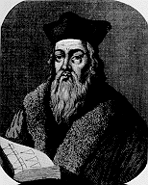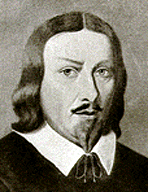Edward Kelly and John Dee: Alchemists Who Transmuted the Stone
Reginald Merton
CONTENTS
Edward Kelly and John Dee
About the middle of the sixteenth century an English lawyer named Edward Kelly, who was travelling in Wales, stopped for the night at an inn in a little mountain village. He was wearing a curious cap that encircled his head and face down to the chin. The cap was never removed and was invariably mentioned when descriptions of him were circulated. This strange headdress served to hide the place where his ears had been — they had just been cut off in London as a punishment for forgery. The innkeeper knew Kelly by the alias with which he introduced himself (Edward Talbot), but the man recognized a person of learning. One night, the innkeeper brought out a tattered old book. He was accustomed to showing his customers, as a curiosity, an unintelligible old manuscript. He showed it to Kelly, who was quite well aware of the profit sometimes to be derived from old papers, and inquired the origin of the manuscript.
It appeared that a few years before, during the religious wars, some Protestant soldiers had rifled the grave of a Catholic bishop, who, during his lifetime, had been a very rich man. In the grave they found this manuscript and two ivory balls, one red and the other white. They broke the red ball and, finding in it nothing but a dark powder, threw it away. The manuscript and the white ball they had left with the innkeeper in exchange for a few bottles of wine. Even as the innkeeper was showing Kelly the manuscript, his children were playing with the white ball.
Kelly suspected something more than met the eye and bought the manuscript and the ball for a guinea. Kelly has an acquaintance, a Dr. John Dee, who had a passionate interest in Hermetic science, and he went to London to see him and showed the items to the learned man. Dee immediately realized that the manuscript dealt with the Philosopher’s Stone and with the methods of finding it, but that it did so in a symbolical form — the meaning of which escaped him. He opened the white ball and found inside it a powder that was none other than the precious projection powder of the alchemists. With its help he was able at his first experiment — in the presence of the astounded Kelly — to make gold.
In fact, to describe Kelly as being astounded hardly conveys his true condition. Most men lose their self-control under the influence of gold, for the royal metal with its dull glitter produces an intoxication which is often more intense than that produced by any alcohol. It increases a man’s base passions, his desire for physical gratification, avarice, and vanity — for indeed, that opposites draw forth each other is an aphorism in alchemy. Gripped by his powerful lust for gold, Kelly made a pact with Dee, whose help was indispensable to him for the operation of transmutation. Since Kelly’s reputation in England was exceedingly bad — a fact of which his cap reminded him at every turn — they began to travel.
The two companions, whose link was gold on whatever level it manifested, went to Bohemia and Germany. Dee was still unable to understand the deceased bishop’s manuscript, but he knew how to use the powder. The lifestyle they kept up and the lectures of Kelly (who boasted of being an adept and of being able to make gold at will) created a great stir wherever they went. Soon, the Emperor Maximilian II sent for Kelly and, with his entire court, was present at an attempted transmutation. The Emperor immediately appointed Kelly the “Marshal of Bohemia,” but what he wanted from him was not a small quantity of projection powder but the very secret of its production. He had Kelly watched and then imprisoned him so that the precious secret should not be lost. Unfortunately Kelly was unable to reveal a secret he did not know, and the stock of the magical powder was nearly exhausted. John Dee, who had been wise enough to realize his own ignorance and remain in obscurity, fled to England, where he sought and received the protection of Queen Elizabeth. The manuscript on which he had labored seems to have kept its secret until his death, for he lived the last part of his life on a small pension given him by the queen. The arrogant Kelly killed one of his guards in an attempt to escape and died in prison when he fell from a wall during subsequent escape attempt.
While in prison, however, Kelly finally realized that the ability to make gold was only the first stage of the alchemists’ great secret. There were actually three accomplishments or “magisteriums” to the Great Work. The second magisterium gave alchemists the means of healing physical illnesses through the same agent that produced transmutation. To reach this stage of the living Elixir, a higher intelligence and a more complete disinterestedness were necessary. The third magisterium was accessible only to a very few alchemists. Just as the molecules of metals are transformed under great increase of temperature, so the emotional elements in human nature undergo an increased intensity of vibrations, which transforms them and makes them spiritual. In its third and final stage, the secret of the Philosopher’s Stone enabled a man’s soul to attain unity with the divine spirit. The laws of Nature are alike for that which is Above and for that which is Below. Nature changes according to an ideal. Gold is the perfection of terrestrial substances, and it is to produce gold that minerals evolve. The human body is the model of the animal kingdom, and living forms orientate themselves in the direction of their ideal type. The emotional substance of the soul strives, through the filter of the senses, to transform itself into spirit and return to unity with the divine. The movements of Nature are governed by this single law, which is diverse in its manifestations but uniform in its essence.

Edward Kelly

Dr. John Dee





